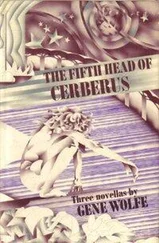* * *
The next time I saw Phaedria, which was four or five days afterward, she was engrossed by a new project in which she enlisted both David and me. This was nothing less than a theatrical company, composed mostly of girls her own age, which was to present plays during the summer in a natural amphitheater in the park. Since the company, as I have said, consisted principally of girls, male actors were at a premium, and David and I soon found ourselves deeply embroiled. The play had been written by a committee of the cast, and—inevitably—revolved about the loss of political power by the original French-speaking colonists. Phaedria, whose ankle would not be mended in time for our performance, would play the crippled daughter of the French governor; David, her lover (a dashing captain of chasseurs); and I, the governor himself—a part I accepted readily because it was a much better one than David’s, and offered scope for a great deal of fatherly affection toward Phaedria.
The night of our performance, which was early in June, I recall vividly for two reasons. My aunt, whom I had not seen since she had closed the door behind Dr. Marsch, notified me at the last moment that she wished to attend and that I was to escort her. And we players had grown so afraid of having an empty house that I had asked my father if it would be possible for him to send some of his girls—who would thus lose only the earliest part of the evening, when there was seldom much business in any event. To my great surprise (I suppose because he felt it would be good advertising) he consented, stipulating only that they should return at the end of the third act if he sent a messenger saying they were needed.
Because I would have to arrive at least an hour early to make up, it was no more than late afternoon when I called for my aunt. She showed me in herself, and immediately asked my help for her maid, who was trying to wrestle some heavy object from the upper shelf of a closet. It proved to be a folding wheelchair, and under my aunt’s direction we set it up. When we had finished she said abruptly, “Give me a hand in, you two,” and taking our arms lowered herself into the seat. Her black skirt, lying emptily against the leg boards of the chair like a collapsed tent, showed legs no thicker than my wrists, but also an odd thickening, almost like a saddle, below her hips. Seeing me staring, she snapped, “Won’t be needing that until I come back, I suppose. Lift me up a little. Stand in back and get me under the arms.”
I did so, and her maid reached unceremoniously under my aunt’s skirt and drew out a little leather padded device on which she had been resting. “Shall we go?” my aunt sniffed. “You’ll be late.”
I wheeled her into the corridor, her maid holding the door for us. Somehow, learning that my aunt’s ability to hang in the air like smoke was physically, indeed mechanically, derived made it more disturbing than ever. When she asked why I was so quiet, I told her and added that I had been under the impression that no one had yet succeeded in producing working antigravity.
“And you think I have? Then why wouldn’t I use it to get to your play?”
“I suppose because you don’t want it to be seen.”
“Nonsense. It’s a regular prosthetic device. You buy them at the surgical stores.” She twisted around in her seat until she could look up at me, her face so like my father’s, and her lifeless legs like the sticks David and I used as little boys when, doing parlor magic, we wished Mr. Million to believe us lying prone when we were in fact crouched beneath our own supposed figures. “Puts out a super-conducting field, then induces eddy currents in the reinforcing rods in the floors. The flux of the induced currents opposes the machine’s own flux and I float, more or less. Lean forward to go forward; straighten up to stop. You look relieved.”
“I am. I suppose antigravity frightened me.”
“I used the iron banister when I went down the stairs with you once; it has a very convenient coil shape.”
Our play went smoothly enough, with predictable cheers from members of the audience who were, or at least wished to be thought, descended from the old French aristocracy. The audience, in fact, was better than we had dared hope, five hundred or so besides the inevitable sprinkling of pickpockets, police, and street-walkers. The incident I most vividly recall came toward the latter half of the first act, when for ten minutes or so I sat with few lines at a desk, listening to my fellow actors. Our stage faced the west, and the setting sun had left the sky a welter of lurid color: purple-reds striped gold and flame and black. Against this violent ground, which might have been the massed banners of Hell, there began to appear, in ones and twos, like the elongate shadows of fantastic grenadiers crenelated and plumed, the heads, the slender necks, the narrow shoulders, of a platoon of my father’s demimondaines; arriving late, they were taking the last seats at the upper rim of our theater, encircling it like the soldiery of some ancient, bizarre government surrounding a treasonous mob.
They sat at last, my cue came, and I forgot them, and that is all I can now remember of our first performance, except that at one point some motion of mine suggested to the audience a mannerism of my father’s and there was a shout of misplaced laughter—and that at the beginning of the second act Sainte Anne rose with its sluggish rivers and great grassy meadow-meres clearly visible, flooding the audience with green light, and at the close of the third I saw my father’s crooked little valet bustling among the upper rows and the girls, green-edged black shadows, filing out.
We produced three more plays that summer, all with some success, and David and Phaedria and I became an accepted partnership, with Phaedria dividing herself more or less equally between us—whether by her own inclination or her parents’ orders I could never be quite sure. When her ankle knit she was a companion fit for David in athletics, a better player of all the ball and racket games than any of the other girls who came to the park, but she would as often drop everything and come to sit with me, where she sympathized with (though she did not actually share) my interest in botany and biology, and gossiped, and delighted in showing me off to her friends, since my reading had given me a sort of talent for puns and repartee.
It was Phaedria who suggested, when it became apparent that the ticket money from our first play would be insufficient for the costumes and scenery we coveted for our second, that at the close of future performances the cast circulate among the audience to take up a collection; and this, of course, in the press and bustle easily lent itself to the accomplishment of petty thefts for our cause. Most people, however, had too much sense to bring to our theater, in the evening, in the gloomy park, more money than was required to buy tickets and perhaps an ice or a glass of wine during intermission; so no matter how dishonest we were the profit remained small, and we, and especially Phaedria and David, were soon talking of going forward to more dangerous and lucrative adventures.
At about this time, I suppose as a result of my father’s continued and intensified probing of my subconscious, a violent and almost nightly examination whose purpose was still unclear to me and which, since I had been accustomed to it for so long, I scarcely questioned, I became more and more subject to frightening lapses of conscious control. I would, so David and Mr. Million told me, seem quite myself though perhaps rather more quiet than usual, answering questions intelligently if absently, and then, suddenly, come to myself, start, and stare at the familiar rooms, the familiar faces, among which I now found myself, perhaps after the midafternoon, without the slightest memory of having awakened, dressed, shaved, eaten, gone for a walk.
Читать дальше










